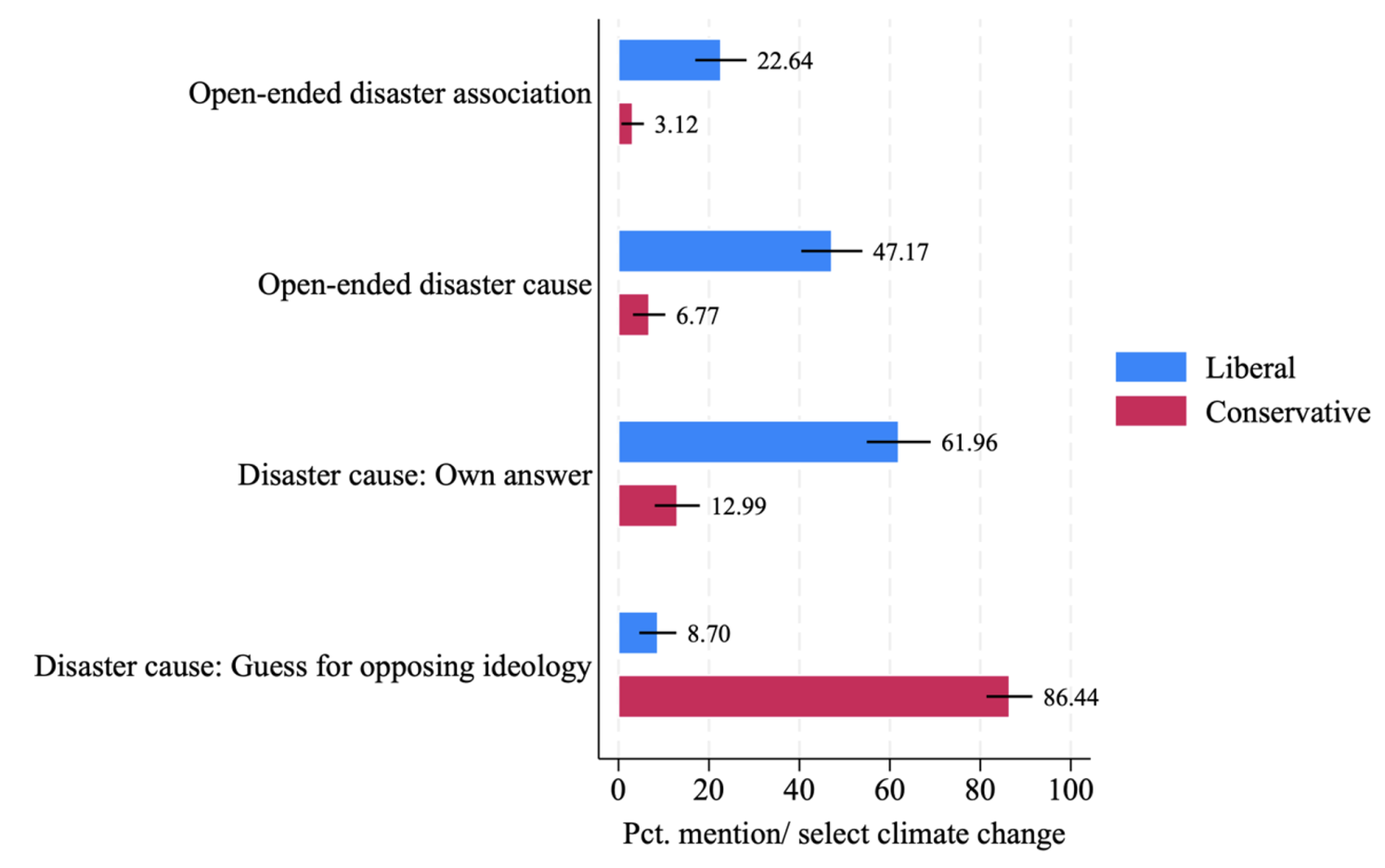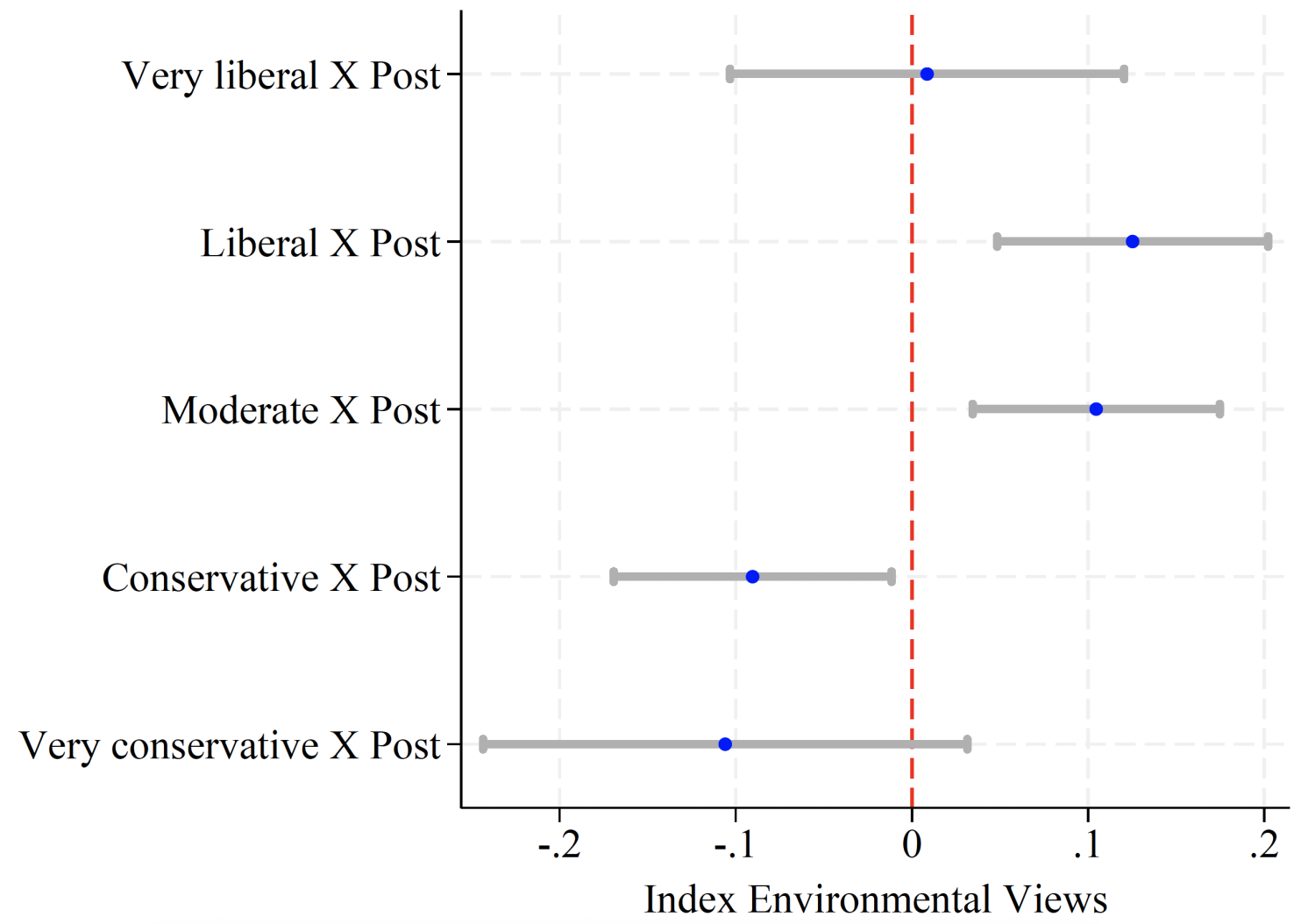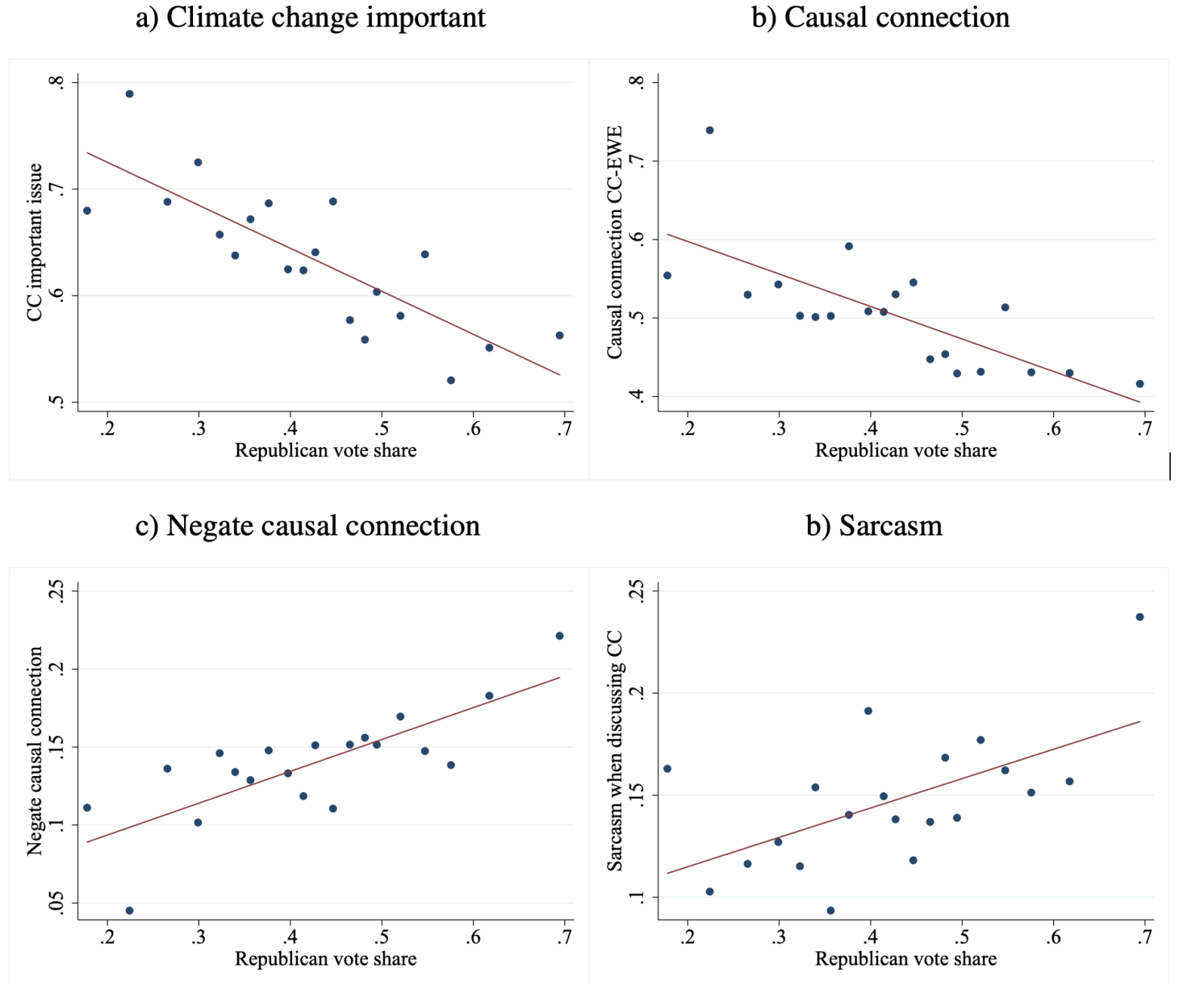Yvew here. On one level, it should not come a surprise that individuals cling to pre-existing beliefs on politicized topics like climate change even when facts pile up against them. This propensity has been well demonstrated in the social psychology literature, even if those findings have not gone mainstream.
For instance, one study many years ago demonstrated that when people are presented with contradictory evidence, most instead double down. In the period when even the US press had started retreating from the WMD in Iraq fabrication, a researcher gathered a group of still-true believers. He showed them a video of demonstrating why the claim was false, including, critically, a clip of President Bush admitting as much.
Even with the seeming showstopper of the Bush walk-back from his Administration’s once-dogged assertions, the viewers afterward scored as more, not less, convinced of the validity of the WMD in Iraq story.
Nevertheless, the notion that some who have actually suffered a climate change related disaster would go deeper into denial seems extreme. But this well-done study also includes the role of partisan media coverage around these event in help the doubters find backing for their views.
By Milena Djourelova, Ruben Durante, Elliot Motte, and Eleonora Patacchini. Originally published at VoxEU
As climate-related disasters become increasingly frequent and destructive, one might expect first-hand experience of these events to bring consensus on the urgency of addressing climate change. Yet, the deep ideological divide on this issue in the US and beyond – combined with highly polarised media coverage – may hinder this process. Combining data on the timing and location of US-based natural disasters with large-scale electoral surveys, this column shows that experiencing disasters actually deepens partisan divisions in climate change attitudes, with significant implications for the public debate and policymaking.
The question of how to increase public support for climate action is at the forefront of policy debates in many countries and is becoming increasingly urgent (Dechezleprêtre et al. 2022, Furceri et al. 2021, Douenne and Fabre 2022).
Yet, partisan differences in public perceptions about the existence and importance of climate change have been increasing over the past decades. For instance, in 2001, 48% of Republicans and 61% of Democrats in the US believed that the effects of climate change had already begun. Today, only 29% of Republicans share this belief, compared to 82% of Democrats (Saad 2021). These diverging trends are concerning, as they suggest that finding common ground on climate solutions may become increasingly difficult in the future.
At the same time, the frequency and severity of climate disasters have been increasing over time (International Panel on Climate Change 2014). Numerous studies have explored the relationship between disaster experience and views on climate change or environmental behaviours; yet, the evidence remains mixed. Some studies find a significant positive impact (Hazlett and Mildenberger 2020, Deryugina 2013, Baccini and Leemann 2020), others a mixed or qualitatively small positive impact (Konisky et al. 2016, Bergquist and Warshaw 2019), and yet others find no effect (Marquart-Pyatt et al. 2014, Carmichael et al. 2017).
In a recent paper (Djourelova et al. 2024a), we revisit the evidence by examining how individual beliefs about climate change respond to disaster experiences in the short term, with a particular focus on ideology as a lens through which these experiences are filtered.
Ideological Differences in the Attribution of Disasters to Climate Change
Our analysis proceeds in two steps. First, we conduct online surveys to understand how individuals reason about the causes of disasters and their association with climate change, using Hurricane Ian as a salient case study. Our findings suggest vast ideological differences in the attribution of the hurricane to climate change and, respectively, in the willingness to support climate action (Figure 1). This suggests that the occurrence of the same disaster is interpreted very differently depending on individual ideology. Eliciting second-order beliefs, we also find that individuals are very much aware of these partisan cleavages.
Figure 1 Attribution of disasters to climate change: Prolific survey

Ideological Differences in the Effect of Disaster Experience on Climate Change Beliefs
In the second and main part of our analysis, we study how individual beliefs on climate change evolve after exposure to a natural disaster. We do so by linking observational data on individual-level views on climate change, expressed in a large electoral survey (the Cooperative Election Study), to the exact timing and location of disasters declared by the Federal Emergency Management Agency.
Our empirical strategy leverages variation in the occurrence of natural disasters in time and space relative to the survey’s roll-out. More specifically, we compare the attitudes of respondents surveyed in the four weeks after a local disaster to those surveyed in the four weeks before the event. We isolate the effect of disasters from other factors affecting climate change attitudes, such as geographical, temporal, or socio-demographic determinants, by comparing respondents living in the same county, who are interviewed during the same year and who share similar characteristics. In order to examine how polarisation on the issue evolves following a disaster, we allow for the effects of disaster exposure on climate change beliefs to differ based on respondents’ political ideology.
Our findings are striking. We observe that disaster exposure tends to widen the ideological gap in climate change beliefs, not close it. After experiencing a disaster, liberal respondents display an increase in their concerns about climate change of around 1.4–2.6 percentage points relative to their pre-disaster level. Meanwhile, conservative respondents’ concerns for climate change decrease by 2.5–2.6 percentage points. These changes are meaningful as they represent a widening of the partisan gap by around 11%. We do not find similar divergence in views on policy issues other than climate change and the environment, and are able to rule out differential reactions by socioeconomic characteristics correlated with ideology, such as income or age, as an explanation for this pattern.
Figure 2 Change in climate change beliefs following a local disaster

The Role of Media Narratives
One reason individuals may revert to and strengthen their pre-existing climate change beliefs is exposure to ideologically biased media accounts of disasters. Indeed, the media is a powerful lens through which people interpret complex events, and the way news outlets report on these events can significantly affect public opinion (Djourelova et al. 2024b).
To explore this explanation, we examine how local newspapers cover disasters and climate change and whether this coverage influences individuals’ beliefs. We gather all newspaper articles mentioning keywords related to natural disasters, on one hand, and to climate change, on the other, from around 1,200 local newspapers. We then measure differences in the quantity and tone of coverage dedicated to disasters and to climate change between liberal and conservative outlets around local disaster events.
Our findings reveal stark differences between liberal and conservative outlets, both in the quantity and in the tone of coverage. Whilst the volume of climate change coverage produced by liberal outlets increases following a local disaster, conservative outlets do not cover climate change more. This is despite liberal and conservative outlets increasing disaster-related coverage at a similar rate.
Additionally, we used the new capabilities provided by large language models such as GPT to capture subtle variations in the tone and content of news stories jointly related to climate change and disasters. Figure 3 shows that liberal outlets are more likely to suggest a causal connection between climate change and disasters. They also imply that climate change is an important issue more often than conservative outlets. Conversely, conservative newspapers have a higher tendency to actively negate the causal connection between climate change and disasters and to use sarcasm when discussing climate change. Our analysis shows that these ideological differences in tone are further amplified in the wake of disasters.
Figure 3 Partisan content differences in articles about climate change and disasters

Finally, our analysis suggests that these ideologically biased media narratives may play a role in polarising climate beliefs. Two pieces of evidence point in this direction. First, we find that the polarising effect of disasters is present only in counties with an active local newspaper, where residents are more likely to encounter ideologically framed climate stories. Second, the effect is more pronounced when local media coverage on climate change clashes with respondents’ ideology. For example, conservative individuals residing in areas with high climate-change coverage display the strongest decrease in climate-change concerns after a disaster. Conversely, liberals in areas with limited climate coverage strengthen their environmental concerns more.
Taken together, these findings underline a concerning trend: rather than fostering a united response to climate change, natural disasters may deepen ideological divides, especially when conflicting media narratives reinforce pre-existing beliefs. Our findings have implications for policymakers and activists. First, they suggest that the timing of attempts to raise awareness about climate change matters – as such, efforts may trigger conservative backlash in the immediate aftermath of disasters. Second, they demonstrate that the politicisation of climate change and conflicting messaging in the mass media is a major obstacle to achieving consensus on this matter.
See original post for references


as I like to say after every new natural disaster, imagine how much worse it would be if this climate change malarkey were real?
It’s similar to the 90’s when the topic was same sex marriage and DOMA (Defense of Marriage Act) (which the so-called “progressive” Clintons supported). Over time American courts overturned DOMA and over time more and more gay couples came out into the open, were featured more in films and television, and people simply realized their biases and prejudices were unfounded, were given an opportunity to adjust. It’s similar to the Civil Rights movement, where long held prejudices about black people were slowly overturned. It’s similar to the Germans after Nazism coming to realize their mistake.
People take a long time to get over prejudice, it’s the time it takes to admit one is wrong to ones friends and family, to make the necessary adjustments and refinements to ones world view, where the social situation changes enough for that to be acceptable. And unfortunately, this is one of those things were time is of essence.
But we do need for peope to come around on their own, rather than imposing beliefs from without.
I think the problem has two parts.
1. In most cases, determining causality is hard. In hardly any natural disaster, drawing a direct obvious linkage to human induced climate change possible. Most people who think it is obvious already have a disposition to believe a causal linkage, justified or not.
2. I’d often noted that people who believe in X->Y linkage too much, and believe X to be something immoral, tend to get too self righteous and offensive–even when they are wrong. There were stories, including on NPR, about how some people got nasty towards lung cancer patients on the mistaken assumption that lung cancer only strikes smokers and smokers are morally deficient. I have seen an attitude similar to this when natural disasters strike areas whose residents are mostly not PMC…like Western NC. I’d be curious if this sort of sentiment is indeed common and how visible it is. If it is indeed “obvious,” then it should not be surprising that people who suffered a natural disaster should think dimly of their notions.
I think there are all sorts of issues going on with how people perceive causal connections – I see it here all the time even in the comments here on NC, where people insist on attaching the causality of climate change to whatever other thing in the world they think is ‘bad’, as opposed to their own lifestyles and choices.
I know a shepherd who is a very thoughtful man who deeply loves his animals and the landscape he was brought up in – he regularly complains about his neighbours who turn their fields into green deserts (‘see that field? not a worm alive in it’ he once said to me). He’s also very involved in local farming organisations that are relentlessly anti-green and pro-corporate in their activism. They genuinely see green activists as the ultimate enemy, and see anti-nitrate laws and carbon taxes as the greatest threat to farmers.
I very much understand his perspective and that of so many farmers, but it’s only as an outsider that can identify where they are factually and politically very wrong. I can also see how very clever manipulation by Big Ag (usually through the farming media) has led to those beliefs (farmers in my experience can simultaneously hate Big AG, while still believing pretty much everything told to them. Most of these people aren’t stupid – they simply buy into illogical ideas driven by society and context, which, in truth, most of us are subject to.
“Sometimes people hold a core belief that is very strong. When they are presented with evidence that works against that belief, the new evidence cannot be accepted. It would create a feeling that is extremely uncomfortable, called cognitive dissonance. And because it is so important to protect the core belief, they will rationalize, ignore and even deny anything that doesn’t fit in with the core belief.” — Frantz Fanon
That is an essence of all religions.
Paul Simon/The Boxer: “A man sees what he wants to see, and disregards the rest”.
Christ: “They have eyes to see, yet will not see.”
Take your pick. Its all the same. Nothing new under the sun.
…
One of problems with author’s studies: we are just 3 seasons into extreme events with broken climate equilibriums. Each one, doing more costly damage, than year before. We’re just getting started after at least 1/2 century of doing nothing.
I’ve seen lots of interviews with people in rural red states that have had their property get washed away, have always been hardcore climate denialists, who now have been reborn. Which brings to mind the old adage:
In my prime earning years I took a decade off to do water and climate work in a 501c 2 of us started. 80 hour weeks. Everything you “found” in your study as been self-evident to many of us for a long time. We need more people on front lines putting their butts on te line demanding climate action, period. No offense, acadamia has its place. Its just way past being able to make a difference in this thing now.
Putting aside the corporate funded, carefully crafted public relations campaign to create denial and doubt, cognitive dissonance, and the psychological bias toward the familiar, most people are not informed and not interested in studying the subject. Climate change has entered public discourse and people take a position on it in a casual way. They don’t take it up on themselves to examine the subject. Twenty percent of the public is illiterate, over 60% are without college training, most are occupied with bills, job and family. Given free time, people have sports, their shows, and hobbies. Climate is not taken seriously, yet. It is an existential problem and is known popularly as existential, but it has not gotten into the consciousness of those who accept it as happening that it is existential.
It is part of ideology, just like everything else. Belonging to a certain group implies being pro or against certain stuff. How many people took it up on themselves to examine the subject before chanting “slava ukraine”?